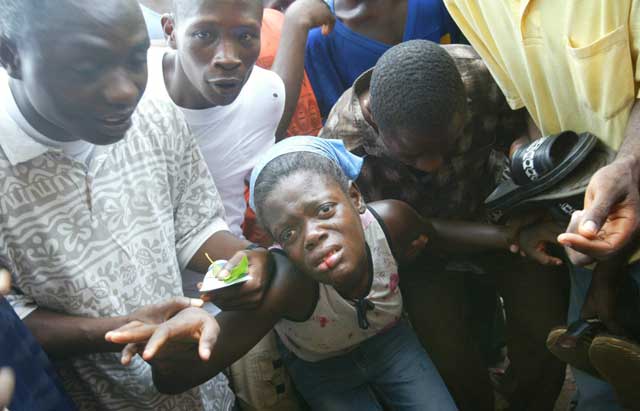Chasing the Devil: The Search for Africa's Fighting Spirit, By Tim Butcher

It's not unusual in West Africa to see dancing "devils" entertaining a crowd of amused local people. Tim Butcher encountered one shortly after crossing the border between Sierra Leone and Liberia, and he describes it in his new book as a masked figure – the headpiece carved from a single piece of jet-black wood – with a floor-length raffia skirt. Everyone knows there's a human being underneath, but the "devil" is accompanied by a young man who keeps brushing its skirt flat to maintain the illusion.
I've seen similar performances in Sierra Leone and always found them unnerving; the spectacle seems benign, but it's the nearest outsiders are likely to get to the secret society, known as Poro, that controls so many aspects of life in West Africa. Its existence isn't discussed within Sierra Leone and Liberia, and scarcely gets a mention in the outside world where child soldiers, amputations and blood diamonds are dreadful symbols of the countries' recent history.
Butcher was for many years chief war correspondent of the Daily Telegraph, and he visited both capital cities, Freetown and Monrovia, during their savage civil wars. He is a veteran of African war zones – his first book, Blood River, followed the route of Stanley's journey through the Congo - and was in Freetown when British troops chased out Foday Sankoh's rebels in May 2000.
During that trip, two of his friends were killed in a rebel ambush, a tragic event that resonates throughout this book. Three years later, after going to Monrovia to report on Charles Taylor's bloody regime, Butcher received a death threat and was warned not to go back as long as the warlord remained in power.
Perhaps because of this history, Butcher was keen to return now that both countries have democratically elected governments. He had read Journey Without Maps, the book Graham Greene published after trekking across Sierra Leone and Liberia with his cousin Barbara in 1935, and last year arrived in Freetown to follow their route via Guinea to Monrovia. Greene had an ulterior motive for his trip and Butcher's research fleshes it out for the first time, establishing that Greene was reporting back to the Anti-Slavery and Aborigines Protection Society. The society wanted to know what was going on in Liberia after a scandal five years earlier when it was revealed that the government had permitted systematic slavery.
Butcher's own trip had another motive besides following in Greene's footsteps. His itinerary allowed him to visit parts of both countries where the fighting was fiercest in the 1990s and find out what ordinary people had suffered at the hands of Sankoh's and Taylor's forces. The two men met in one of Colonel Gaddafi's terrorist training camps in Libya, overthrew their respective governments, and set about making fortunes from Sierra Leone's diamonds.
Butcher's book is packed with incident and he finds plenty of evidence of the wars. He also finds widespread corruption and reports that the two capitals, strongholds of the descendants of freed slaves, continue to suck in resources to the detriment of indigenous tribes inland. Crucially, he makes a connection between the otherwise inexplicable atrocities committed during both conflicts and the traditional practices of Poro. Details of Poro initiation rituals are hard to come by but they're known to involve scarification, while the women's secret societies – Bundu in Sierra Leone, Sande in Liberia – take girls into the bush and carry out female genital mutilation. Earlier this year, I was caught in a riot near Freetown when members of Poro disrupted a public event attended by government ministers. It was a terrifying experience.
Butcher comes to the realisation that it is the clandestine influence of the secret societies and their rigid codes – they've been accused of murdering individuals who refuse to join – that accounts for the failure of Sierra Leone and Liberia to thrive in the post-war period. The devil – the tyrannical figure atop a suffocating belief system of secret rules that crush the individual – must be chased away, he concludes. This is an important insight, but that's only one reason for reading this fascinating, harrowing and eventful book.
Joan Smith is Political Blonde: www.politicalblonde.com
Join our commenting forum
Join thought-provoking conversations, follow other Independent readers and see their replies
Comments
Bookmark popover
Removed from bookmarks